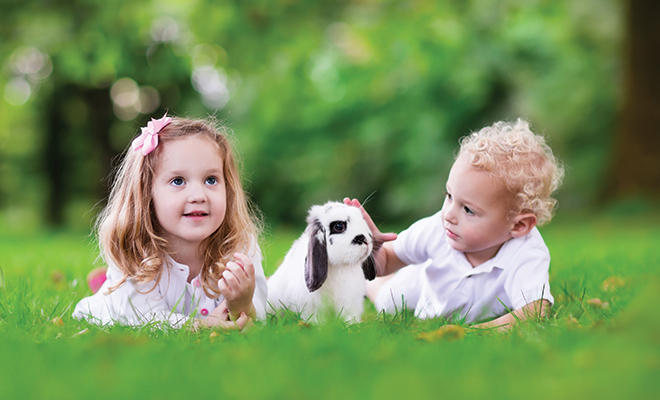
What it means to love some bunny
Wiggly noses, soft puff-ball tails, inquisitive eyes–when it comes to rabbits, what’s not to love? Rabbits are growing in favor as household pets and are now more popular than hamsters. The increase in rabbit ownership has boosted them to third place behind cats and dogs in the realm of companion mammals.
But this popularity isn’t new; as early as the 1700s cottontails were used by humans as companions. To alleviate the pain of depression, hares were the companions of British poet William Cowper as well. He wrote of their personalities and how they lifted his spirits. Today, the little creatures are doing the same for thousands of adults and kids alike.
Kids and rabbits
Traditionally, rabbits have been given to children as Easter or birthday presents. Unfortunately, parents seldom do enough research about owning rabbits to understand that small children and rabbits are not the best combination. Too often, rough treatment by a child results in injury to the pet. Many times the rabbit ends up at an animal shelter for scratching or biting the child, only to be euthanized. What parents fail to understand is that the rabbit was simply acting in self-defense.
The little darlings look soft and cuddly because of their fur and the sweet look on their faces; however, the holding and cuddling that most young children love to lavish on their pets is not compatible with the rabbit’s personality. These creatures often feel insecure and frightened by such loving attentions because it is similar to the grasp of a predator. Acting on instinct, a rabbit that feels threatened will wildly thrash, kick with their powerful hind legs and use their tiny toenails in defense. Rabbit owners of all ages need to learn to move slowly, be gentle and know the proper way to pick up their floppy-tailed friend without injury to all parties involved.
Using the bunny powder room
When it comes to rabbits and their bathroom habits they, by nature, choose one or a few places, usually corners, to leave their deposits. Penned rabbits will do fine in a rabbit condo that is up off of the floor with a litter pan underneath, but many rabbit owners are convinced that they should be able to train Hoppy to use the litter pan like a cat.
Truth be told, domestic rabbits are very hard to litter pan train unless they are spayed or neutered. Rabbit owners who are determined to let bunny have the run of the house should also be prepared to have him or her treat their home as one very large litter box. Once the go-wherever-I-please habit is established, it is very hard to correct. Even if owners are successful in litter training their pet, rabbits that are allowed to roam free should still be monitored in case they spring a leak and need to be shooed toward their litter pan.
Basic rabbit care
It is advisable for parents to teach their children how to properly interact with their furry companion in ways that are not threatening and to accept primary responsibility for the pet, too. Owners need to provide a cage large enough to have room for bunny’s food, litter box and water bowl while still allowing them ample room to stretch out. Cages should be cleaned twice a week and litter pans should be emptied daily. Rabbits in dirty cages can get sick and die and the smell can get to unhealthy levels for animals and humans pretty quickly. Unfortunately, some rabbit owners get weary of their pet and release the rabbit into the wild, thinking that giving it freedom is a good thing. Unfortunately, domesticated rabbits don’t have a clue how to fend for themselves and they quickly wind up being prey for other animals.
If your household is committed to adding a cottontail to the family, start by visiting a foster home for rabbits or one of the more progressive shelters as a way to get to know the nuances of rabbit ownership. Pet stores and rabbit shows are not the best places to scope out your new pet because they tend to be high-stress environments. Adopting a pet rabbit will provide your family with the opportunity to get to know some bunny before bringing it home.
Another perk in adopting a rabbit is that it will most likely be neutered, which will prevent or lessen the issues of spraying or being territorial that male rabbits are known for. Spend time observing their unique and fun personalities as well. Some rabbits will be silly and playful while others may be aloof and independent. Choose the rabbit that fits your family the best and keep in mind that he or she will take just as much care as a puppy or kitten. Learning about these wonderful little creatures before you bring them home is always the best and wisest move. HLM
Sources: petfinder.com, rabbit.org and rabbithaven.org.







